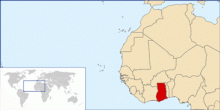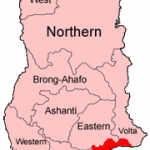Regional Background
The Republic of Ghana is a country in West Africa. The word Ghana means "Warrior King.”
Ghana was inhabited in pre-colonial times by a number of ancient kingdoms, including the Ga-Da_mes on the eastern coast, the inland Ashanti Empire and various Fante and Ewe states along the coast and inland. Trade with European states flourished after contact with the Portuguese in the 15th century, and the British established a crown colony, Gold Coast, in 1874.
The Gold Coast achieved independence from the United Kingdom on 6th March 1957, becoming the first Sub-Saharan African nation to do so. The name Ghana was chosen for the new nation to reflect the ancient Empire of Ghana which once extended throughout much of western Africa.
She became a Republic on the 1st of July, 1960, and the current estimated population is 23.9 million of which 70% are Christians with various religious denominations.
Currently Ghana is one of the most peaceful democratic countries in Africa. There are more than 250 languages and dialects, but English is considered the official language and predominates in government and business affairs. It is also the standard language used for educational instruction.
Ghana’s culture is a mixture of many ethnic groups, the Ashanti, Fante, Akyem, Kwahu, Ga, Ewe, Mamprusi and Dagomba among others.
Though well-endowed with natural resources, Ghana remains somewhat dependent on trade and international assistance as well as the investment activities of Ghanaian Diaspora. About 30 % of the population live below the international poverty line of US$1.25 a day.
Country Statistics
| Country (long form) | Republic of Ghana |
| Capital | Accra |
| Total Area |
92,100.81 sq mi 238,540.00 sq km (slightly smaller than Oregon) |
| Population |
19,894,014 (July 2001 est.) note: estimates for this country explicitly take into account the effects of excess mortality due to AIDS; this can result in lower life expectancy, higher infant mortality and death rates, lower population and growth rates, and changes in the distribution of population by age and sex than would otherwise be expected |
| Estimated Population in 2050 | 31,952,685 |
| Languages | English (official), African languages (including Akan, Moshi-Dagomba, Ewe, and Ga) |
| Literacy | 64.5% total, 75.9% male, 53.5% female (1995 est.) |
| Religions | indigenous beliefs 38%, Muslim 30%, Christian 24%, other 8% |
| Life Expectancy | 55.86 male, 58.66 female (2001 est.) |
| Government Type | constitutional democracy |
| Currency | 1 new cedi (C) = 100 pesewas |
| GDP (per capita) | $1,900 (2000 est.) |
| Industry | mining, lumbering, light manufacturing, aluminum smelting, food processing |
| Agriculture | cocoa, rice, coffee, cassava (tapioca), peanuts, corn, shea nuts, bananas; timber |
| Arable Land | 12% |
| Natural Resources | go |






